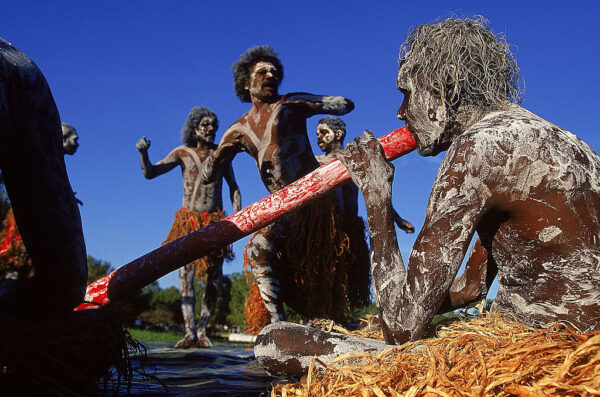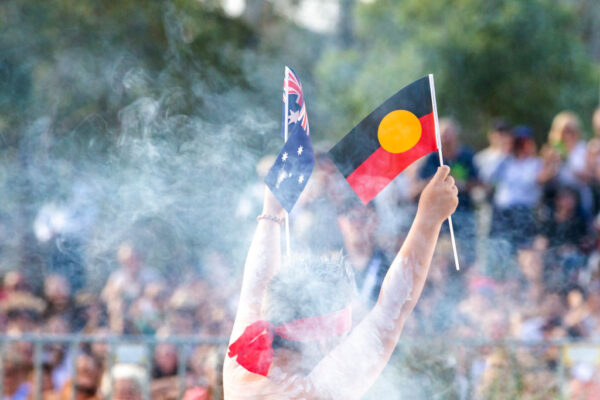A Voice for Dividing Australians
CommentaryOn July 30, Australian Prime Minister Anthony Albanese used an address at an Indigenous Festival in the Northern Territory to reveal the referendum question which may be put to the Australian people to enshrine the Voice in the Constitution. Although it is still a draft referendum question, it gives an insight into the thinking of the government on this contentious issue. The question is: “Do you support an alteration to the Constitution that establishes an Aboriginal and Torres Strait Islander Voice?” The prime minister also suggested that three provisions be added to the Constitution if the referendum were to succeed: the first would entrench the Voice in the Constitution; the second would allow the Voice to make representations to parliament and the executive government on matters relating to Aboriginal and Torres Strait Islander Peoples (ASTI). The third proposes to insert, into the Constitution, a new head of legislative power, according to which the parliament shall have power to make laws with respect to the functions and procedures of the Voice. The centre-left Labor government will try to enlist the Opposition into supporting the referendum. In this context, it is interesting to note that the Opposition’s Indigenous affairs spokesperson, Julian Leeser, described the prime minister’s speech as a “positive step.” The Voice is the government’s response to the recommendations made by an Aboriginal National Constitutional Convention held in 2017 and resulted in the release of a document, the Uluru Statement from the Heart. The document proposed the establishment of an Indigenous Voice in parliament to empower ATSI people, and the establishment of the Makarrata Commission to supervise a process of agreement-making with Australian governments and oversee a process of truth-telling about Australia’s history and colonisation. Entrenching the Voice into the Constitution As a referendum on the Voice is likely to be held in this term of parliament, it is appropriate to consider the three provisions. With regard to the first provision, the entrenchment of the Voice in the Constitution, it may be noted that over the years, there have been countless, and sometimes corrupt, Aboriginal quangos, like the ATSI Commission, that have wasted millions of dollars. Australia’s Indigenous population is estimated to constitute 3.2 percent of the total population; it is the only racial group that has its own federal minister, and every state and territory has a Ministry for Indigenous Affairs. By any standard, the Indigenous industry has spawned the creation of huge, bloated bureaucracies, the maintenance of which is expensive. Often, these administrative behemoths have designed and administered doomed policies, including the cashless credit card, alcohol prohibition, housing, and social welfare programs. Aboriginal dancers perform during the 2000 Sydney Olympic Torch Relay at Yellow Water in Kakadu National Park, Northern Territory, Australia on 29 June 2000. (Adam Pretty/ALLSPORT) If these precedents are an indication, there is no hope that the Voice would be any better. In fact, it would be far worse because it would be impossible to remove a body that is entrenched in the Constitution. But the most important flaw in the potential enshrinement of the Voice in the Constitution is it is granting of special privileges to one group merely on the ground of the race of its members. The distribution of societal benefits on the ground of a person’s race, which is an incident of birth, makes a mockery of governments’ stated reassurances to create a society where a person’s race is irrelevant and the administration of justice is colour-blind. Voice Advisory Body In accordance with the second proposed addition to the Constitution, the Voice would be a standing advisory body that would make representations to the government on laws and policies affecting ATSI people in Australia. The requirement of “consultation” raises the question of whether it would be sufficient to ask the Voice for an opinion or whether it must give an opinion. If the adoption of legislation is delayed until the Voice provides governments with its opinion, it could effectively veto legislation by adopting the convenient device of not giving an opinion at all and paralyse the machinery of government. In such a case, the Voice would effectively function as a third chamber in addition to the House of Representatives and the Senate. Of course, implementing legislation could restrict the advisory power of the Voice to a consideration of proposed laws and policies that actually or potentially affect ATSI people. However, such an argument is disingenuous because all general laws, since they are made for all the people of Australia, potentially impact on Indigenous Australians. Indeed, unless the government wants to create an institutionalised form of apartheid, it is not appropriate to exempt any racial group from the application of Australi

Commentary
On July 30, Australian Prime Minister Anthony Albanese used an address at an Indigenous Festival in the Northern Territory to reveal the referendum question which may be put to the Australian people to enshrine the Voice in the Constitution. Although it is still a draft referendum question, it gives an insight into the thinking of the government on this contentious issue.
The question is: “Do you support an alteration to the Constitution that establishes an Aboriginal and Torres Strait Islander Voice?”
The prime minister also suggested that three provisions be added to the Constitution if the referendum were to succeed: the first would entrench the Voice in the Constitution; the second would allow the Voice to make representations to parliament and the executive government on matters relating to Aboriginal and Torres Strait Islander Peoples (ASTI). The third proposes to insert, into the Constitution, a new head of legislative power, according to which the parliament shall have power to make laws with respect to the functions and procedures of the Voice.
The centre-left Labor government will try to enlist the Opposition into supporting the referendum. In this context, it is interesting to note that the Opposition’s Indigenous affairs spokesperson, Julian Leeser, described the prime minister’s speech as a “positive step.”
The Voice is the government’s response to the recommendations made by an Aboriginal National Constitutional Convention held in 2017 and resulted in the release of a document, the Uluru Statement from the Heart.
The document proposed the establishment of an Indigenous Voice in parliament to empower ATSI people, and the establishment of the Makarrata Commission to supervise a process of agreement-making with Australian governments and oversee a process of truth-telling about Australia’s history and colonisation.
Entrenching the Voice into the Constitution
As a referendum on the Voice is likely to be held in this term of parliament, it is appropriate to consider the three provisions.
With regard to the first provision, the entrenchment of the Voice in the Constitution, it may be noted that over the years, there have been countless, and sometimes corrupt, Aboriginal quangos, like the ATSI Commission, that have wasted millions of dollars.
Australia’s Indigenous population is estimated to constitute 3.2 percent of the total population; it is the only racial group that has its own federal minister, and every state and territory has a Ministry for Indigenous Affairs.
By any standard, the Indigenous industry has spawned the creation of huge, bloated bureaucracies, the maintenance of which is expensive. Often, these administrative behemoths have designed and administered doomed policies, including the cashless credit card, alcohol prohibition, housing, and social welfare programs.

If these precedents are an indication, there is no hope that the Voice would be any better. In fact, it would be far worse because it would be impossible to remove a body that is entrenched in the Constitution.
But the most important flaw in the potential enshrinement of the Voice in the Constitution is it is granting of special privileges to one group merely on the ground of the race of its members. The distribution of societal benefits on the ground of a person’s race, which is an incident of birth, makes a mockery of governments’ stated reassurances to create a society where a person’s race is irrelevant and the administration of justice is colour-blind.
Voice Advisory Body
In accordance with the second proposed addition to the Constitution, the Voice would be a standing advisory body that would make representations to the government on laws and policies affecting ATSI people in Australia. The requirement of “consultation” raises the question of whether it would be sufficient to ask the Voice for an opinion or whether it must give an opinion.
If the adoption of legislation is delayed until the Voice provides governments with its opinion, it could effectively veto legislation by adopting the convenient device of not giving an opinion at all and paralyse the machinery of government. In such a case, the Voice would effectively function as a third chamber in addition to the House of Representatives and the Senate.
Of course, implementing legislation could restrict the advisory power of the Voice to a consideration of proposed laws and policies that actually or potentially affect ATSI people.
However, such an argument is disingenuous because all general laws, since they are made for all the people of Australia, potentially impact on Indigenous Australians. Indeed, unless the government wants to create an institutionalised form of apartheid, it is not appropriate to exempt any racial group from the application of Australia’s general laws.

Group Membership
Finally, the determination of “the composition, functions, powers and procedures” of the Voice would require the parliament to draft detailed rules on establishing group membership. This would lead to intractable problems associated with attempts to prove membership of a group.
The sponsors of the Voice may attempt to sidestep this difficulty by arguing that societal disadvantage, which is much easier to determine, is a suitable proxy for determining group membership. Such an attempt certainly has merit, but it still raises the question of why one disadvantaged group, among others, is selected for special treatment.
There is also a danger that those who advocate for the “No” vote will be demonised as racists. Such an accusation, of course, would affect the ability to frankly and openly debate the issues associated with the Voice. Indeed, critics would certainly be described as bigoted troglodytes if they were to question the proposed enshrinement of the Voice in the Constitution.
The establishment of the Voice may well constitute a violation of the United Nations Convention on the Elimination of All Forms of Racial Discrimination. In one section, it stipulates that: “Special measures taken for the sole purpose of securing adequate advancement of certain racial or ethnic groups … shall not be deemed racial discrimination, provided, however, that such measures do not, as a consequence, lead to the maintenance of separate rights for different racial groups.”
The enshrinement of the Voice in the Constitution would clearly offend this convention, thus institutionalising discrimination in Australia and potentially affecting all aspects of society.
Views expressed in this article are the opinions of the author and do not necessarily reflect the views of The Epoch Times.












